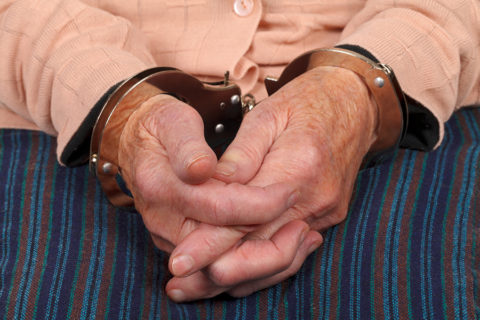September 8, 2017 by

It’s almost inconceivable – a pleasant, elderly, at times confused grandmother with Alzheimer’s disease being handcuffed and put under arrest. And yet that very scene is playing out at an alarming rate among older persons, over 100,000 of them, according to the most recent statistics – an increase of just about 30% in the past decade. This significant increase in arrests among the elderly might be in part because of the growth in the population of older adults, as well as the rise in diagnoses of Alzheimer’s disease and other types of dementia.
Dealing with dementia is difficult on a normal day, but what happens when dementia symptoms become criminal? Along with the anxiety and aggression that can accompany dementia, and various other erratic behaviors that would constitute the need for police intervention among the public, one particular solution lies in education. Dr. Brie Williams, geriatrician and director of the University of California, San Francisco’s Criminal Justice Aging Project, highlights the necessity for appropriate police responses to dementia-induced actions. In a nutshell, this requires determining the answer to, “Is there a medical explanation for engaging in what’s traditionally viewed as criminal behavior?”
And besides criminal worries, other situations involving older adults with dementia are more often calling for law enforcement to step in, like people with Alzheimer’s wandering away and getting lost, or being asked to check up on the elderly at the request of worried family members, neighbors, friends, or medical personnel.
Fortunately, the San Francisco Police Department has taken measures to ensure its law enforcement team is educated in proper intervention practices, as well as given resources for beneficial services and local resources to support the elderly, including those with Alzheimer’s disease or other types of dementia. With other police departments nationwide expressing interest in implementing equivalent programs, the hope is that additional empathy and knowledge of dementia will help all of us better support those who are in desperate need of professional care to live more full, rewarding and undisruptive lives.
Are you a Syracuse caregiver dealing with dementia symptoms with a senior loved one? For specialized Alzheimer’s and dementia care, tips, and resources, contact At Home Independent Living’s Syracuse home care experts. Our fully qualified and knowledgeable professional dementia care team offers patient, consistent care that gives comfort to family caregivers, keeping their family members safe at home, helping them participate in mentally stimulating activities and physical activity as appropriate, and looking after daily activities that would require help. Starting with the creation of a customized plan of care, that plan is then executed and modified ongoing as needs change. Serving Syracuse and the surrounding area, call us at 315-579-HOME to learn more.
